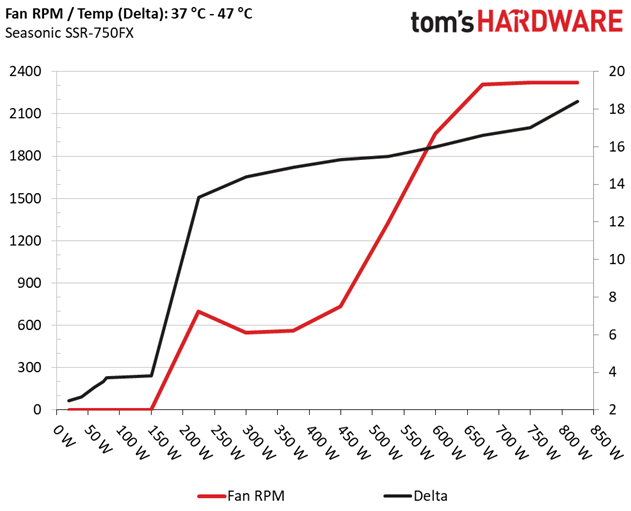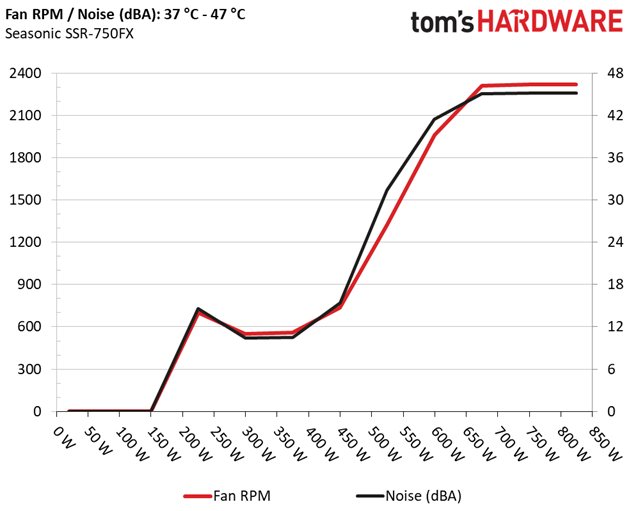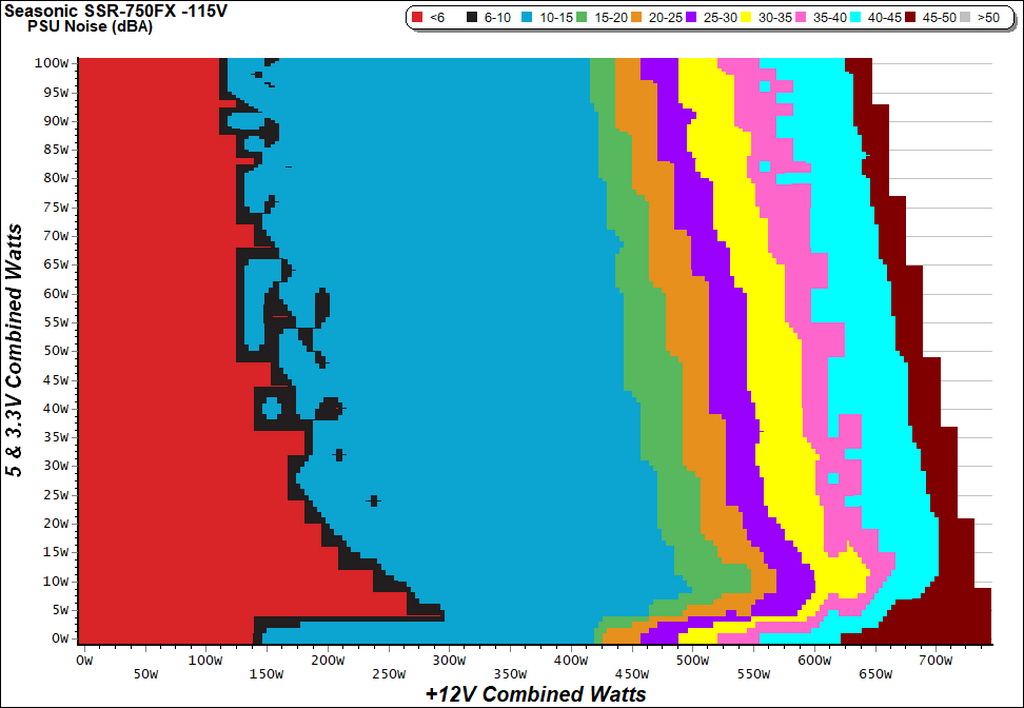Seasonic Focus Plus 750 Gold PSU Review
Why you can trust Tom's Hardware
Efficiency, Temperature & Noise
Efficiency
Our efficiency testing procedure is detailed here.
Using results from the previous page, we plotted a chart showing the SSR-750FX's efficiency at low loads, and loads from 10 to 110 percent of its maximum-rated capacity.
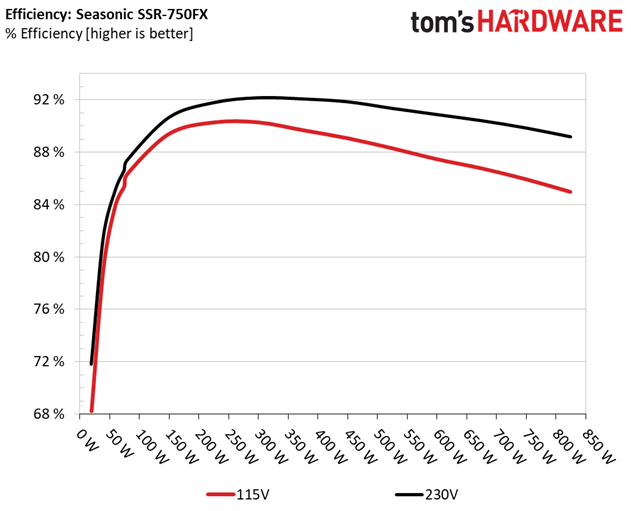
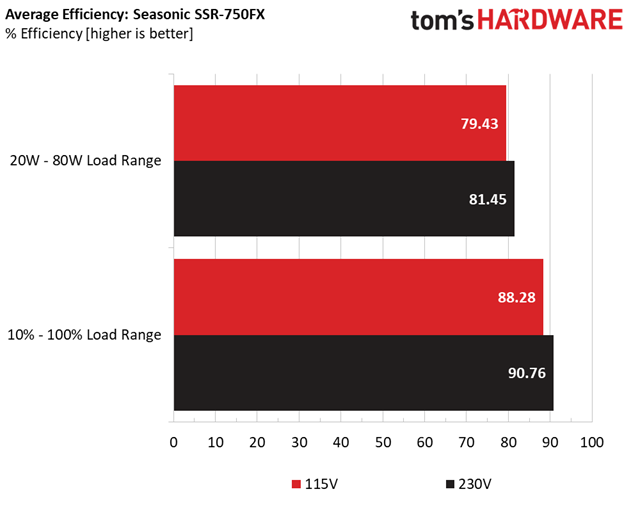
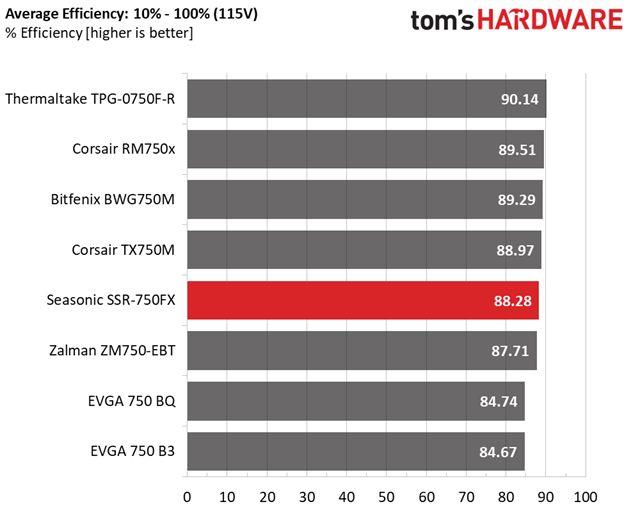
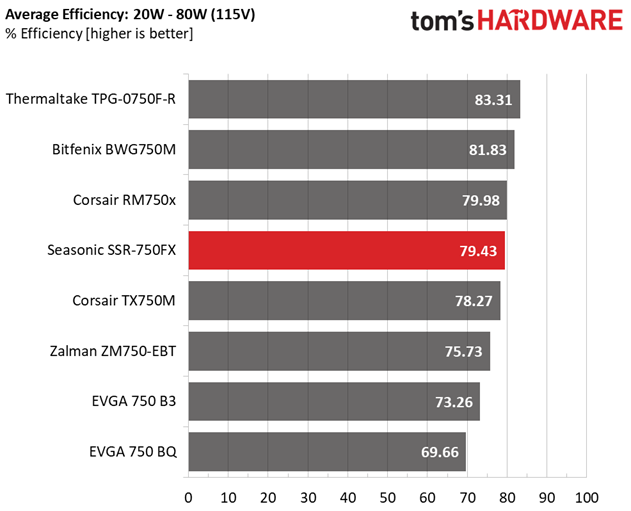
Under normal loads, the Seasonic platform isn't as efficient as its competition. For instance, compared to Corsair's RM750x, the difference is notable. Even the similarly-priced TX750M achieves higher efficiency.
The situation improves under light loads, where Seasonic's platform takes the lead from Corsair's TX750M. However, the RM750x is still ahead of the SSR-750FX.
Efficiency At Low Loads
In the following tests, we measure the SSR-750FX's efficiency at loads significantly lower than 10 percent of its maximum capacity (the lowest load the 80 PLUS standard measures). The loads we dialed were 20, 40, 60, and 80W. This is important for representing when a PC is idle, with power-saving features turned on.
| Test # | 12V | 5V | 3.3V | 5VSB | DC/AC (Watts) | Efficiency | Fan Speed | PSU Noise | PF/AC Volts |
|---|---|---|---|---|---|---|---|---|---|
| 1 | 1.205A | 0.493A | 0.482A | 0.195A | 19.665 | 68.239% | 0 RPM | <6.0 dB(A) | 0.750 |
| 12.115V | 5.017V | 3.308V | 5.121V | 28.818 | 115.20V | ||||
| 2 | 2.433A | 0.991A | 0.997A | 0.391A | 39.753 | 79.148% | 0 RPM | <6.0 dB(A) | 0.884 |
| 12.120V | 5.015V | 3.305V | 5.114V | 50.226 | 115.20V | ||||
| 3 | 3.665A | 1.487A | 1.509A | 5.106A | 59.862 | 83.966% | 0 RPM | <6.0 dB(A) | 0.938 |
| 12.124V | 5.013V | 3.304V | 5.106V | 71.293 | 115.20V | ||||
| 4 | 4.880A | 1.996A | 1.995A | 0.780A | 79.756 | 86.353% | 0 RPM | <6.0 dB(A) | 0.959 |
| 12.128V | 5.012V | 3.303V | 5.099V | 92.360 | 115.21V |
With a 20W load, we would like to see over 70% efficiency. Under 40W of load, it would be nice to go over 80%. But this PSU only breaks the 80% mark in the last two tests. The fan doesn't spin during any of these tests, so noise is kept to a minimum.
5VSB Efficiency
The ATX specification, along with CEC, ErP Lot 3 2014 and ErP Lot 6 2010/2013, states that 5VSB standby supply efficiency should be as high as possible, recommending 75 percent or higher with 550mA, 1A, and 1.5A of load. The PSU should also achieve higher than 75% efficiency at 5VSB under full load, or with 3A if its max current output on this rail is higher than 3A.
Get Tom's Hardware's best news and in-depth reviews, straight to your inbox.
We take six measurements: one each at 100, 250, 550, 1000, and 1500mA, and one with the full load the 5VSB rail can handle.
| Test # | 5VSB | DC/AC (Watts) | Efficiency | PF/AC Volts |
|---|---|---|---|---|
| 1 | 0.101A | 0.519 | 74.143% | 0.109 |
| 5.126V | 0.700 | 115.37V | ||
| 2 | 0.251A | 1.287 | 76.744% | 0.219 |
| 5.123V | 1.677 | 115.38V | ||
| 3 | 0.542A | 2.771 | 77.968% | 0.329 |
| 5.116V | 3.554 | 115.38V | ||
| 4 | 1.002A | 5.113 | 78.085% | 0.400 |
| 5.105V | 6.548 | 115.34V | ||
| 5 | 1.501A | 7.647 | 78.246% | 0.436 |
| 5.094V | 9.773 | 115.34V | ||
| 6 | 3.001A | 15.153 | 76.176% | 0.485 |
| 5.049V | 19.892 | 115.33V |
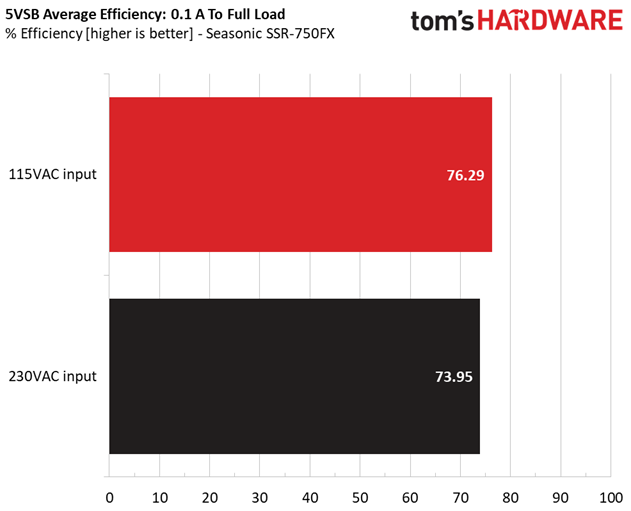
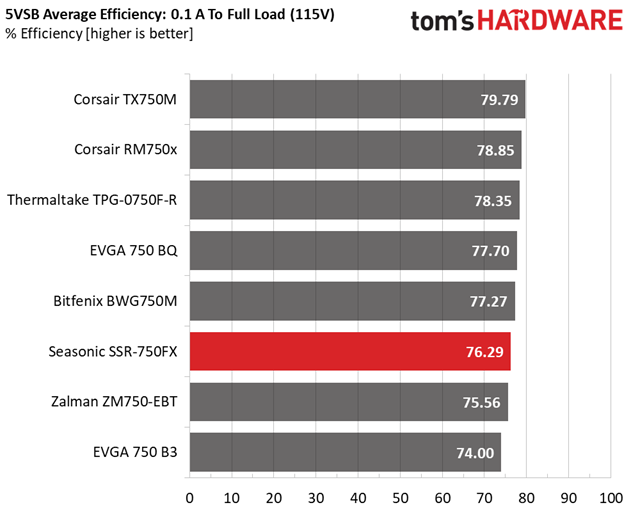
The 5VSB rail isn't as efficient as we expected, particularly since Seasonic typically uses highly efficient 5VSB circuits in its designs.
Power Consumption In Idle And Standby
In the table below, you'll find the power consumption and voltage values of all rails (except -12V) when the PSU is idle (powered on, but without any load on its rails), and the power consumption when the PSU is in standby mode (without any load, at 5VSB).
| Mode | 12V | 5V | 3.3V | 5VSB | Watts | PF/AC Volts |
|---|---|---|---|---|---|---|
| Idle | 12.114V | 5.019V | 3.309V | 5.127V | 7.403 | 0.447 |
| 115.2V | ||||||
| Standby | 0.046 | 0.008 | ||||
| 115.4V |
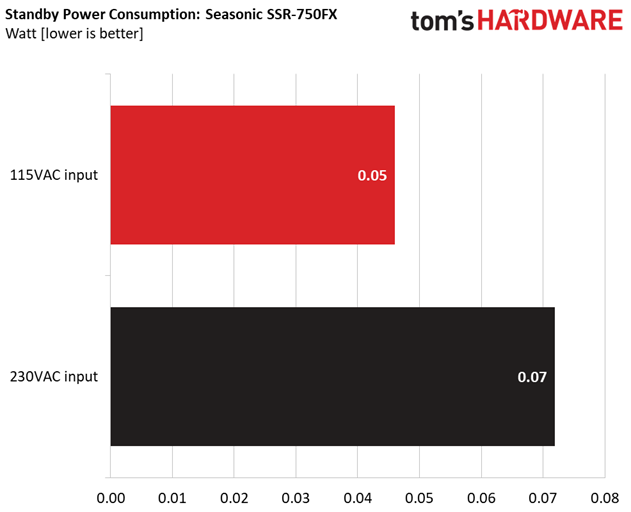
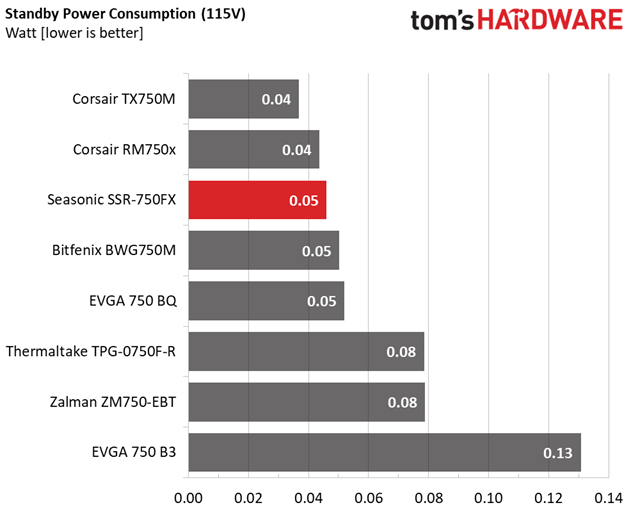
Vampire power remains at very low levels under both voltage inputs.
Fan RPM, Delta Temperature, And Output Noise
Our mixed noise testing is described in detail here.
The chart below illustrates the cooling fan's speed (in RPM), and the delta between input and output temperature. The results were obtained at 37°C (98.6°F) to 47°C (116.6°F) ambient temperature.
The next chart shows the cooling fan's speed (again, in RPM) and output noise. We measured acoustics from one meter away, inside a hemi-anechoic chamber. Background noise inside the chamber was below 6 dB(A) during testing (actually it is much lower, but our sound meter’s microphone hits its floor), and the results were obtained with the PSU operating at 37°C (98.6°F) to 47°C (116.6°F) ambient temperature.
The following graph illustrates the fan's output noise over the PSU's operating range. The same conditions of the above graph apply to our measurements, though the ambient temperature was between at 30°C (86°F) to 32°C (89.6°F).
The fan's passive mode doesn't last long. Then, it spins slowly, remaining in the 10-15 dB(A) range. With more than 490W on the +12V rail, the fan starts to make its presence felt. As the load exceeds 550W, output noise exceeds 40 dB(A). Beyond 620W load on the +12V rail, the situation gets serious, and the fan generates more than 45 dB(A).
MORE: Best Power Supplies
MORE: How We Test Power Supplies
MORE: All Power Supply Content
Current page: Efficiency, Temperature & Noise
Prev Page Load Regulation, Hold-Up Time & Inrush Current Next Page Protection Features
Aris Mpitziopoulos is a contributing editor at Tom's Hardware, covering PSUs.
-
none77 Thank you for the detailed review.Reply
In the transient response test
Advanced Transient Response at 50 Percent – 200ms
the +3.3 pass.
-
BugariaM As always, here are the most detailed reviews on the PSU.Reply
Thank you and keep it up!
The only thing that is not quite clear to me. What is the criterion for voltage drop in % to get PASS/FAIL in "Advanced Transient Response Tests"?
You declare that:
"In all tests, we measure the voltage drops." The voltages should remain within the ATX specification's regulation limits. "
For ATX 2.2 we have:
12v - 10%
5v - 5%
3.3v - 5%
5VSB - 5%
However, looking at your reviews, there are often situations where, at <5%, the power supply gets the FAIL mark and vice versa, some at >5% receive PASS
Why is this happening? -
Aris_Mp the limit is 5% however the voltage rails of the PSUs' under test in the majority of cases aren't at the nominal voltages, but higher, so even with 5% deviation voltages go don't bellow the limits that the ATX spec sets (11.4V, 4.75V, 3.14V). Only if a rail goes below those voltage levels it fails. The 5% is just an indication that the ATX provides to specify the voltages above.Reply -
fredlaso Dell Inspiron 5675 Desktop, PSU (power supply unit), upgrade. Would this PSU compatible with Dell Inspiron 5675 Desktop. It came with 460W I would like to replace it with PSU between 650 to 750W. I tried at Dell forums but cannot get a clean link which one would be compatible.Reply
I would greatly appreciate if someone could help me out. Thank you kindly in advance:
http://en.community.dell.com/support-forums/desktop/f/3514/t/20019321?pi21953=1#21018407
http://en.community.dell.com/support-forums/desktop/f/3514/p/20024419/21031446#21031446
System Comp,:
Compatible Power Supply needed for Inspiron 5675 Gaming Power Supply
Specs:
AMD Ryzen 7 1700X 3.4GHz Octa-Core Processor
8GB 2400MHz DDR4 RAM
1TB 7200 RPM Hard Drive
AMD Radeon RX 580 8GB GDDR5 Graphics Card
DVD+RW Drive
Dual Band WiFi 802.11ac + Bluetooth 4.1
Windows 10 Home (64-bit)
460 Watt Power Supply w/ Polar Blue LED
Includes: Dell KB216 Wired Keyboard + Dell MS116 Wired Mouse
Ports:
6x USB 3.0
1x USB 3.1 Type-C Gen 1
2x USB 2.0
1x Audio Combo Jack
1x 3-in-1 Media Card Reader
1x P/S 2
1x 7.1 Channel Audio Out
Expansion Slots:
3x 3.5" bay
2x 2.5" bay
2x PCIe x1
2x PCIe x16
http://en.community.dell.com/support-forums/desktop/f/3514/t/20019321?pi21953=1#21018407
http://en.community.dell.com/support-forums/desktop/f/3514/p/20024419/21031446#21031446 -
paulinosaka My Seasonic Platinum began failing under load after only 10 months. Paid cash here in Japan at Joshin - couldnt find reciept - honestly never thought I would need it ever. Seasonic would not help me.?Reply
REPLY
